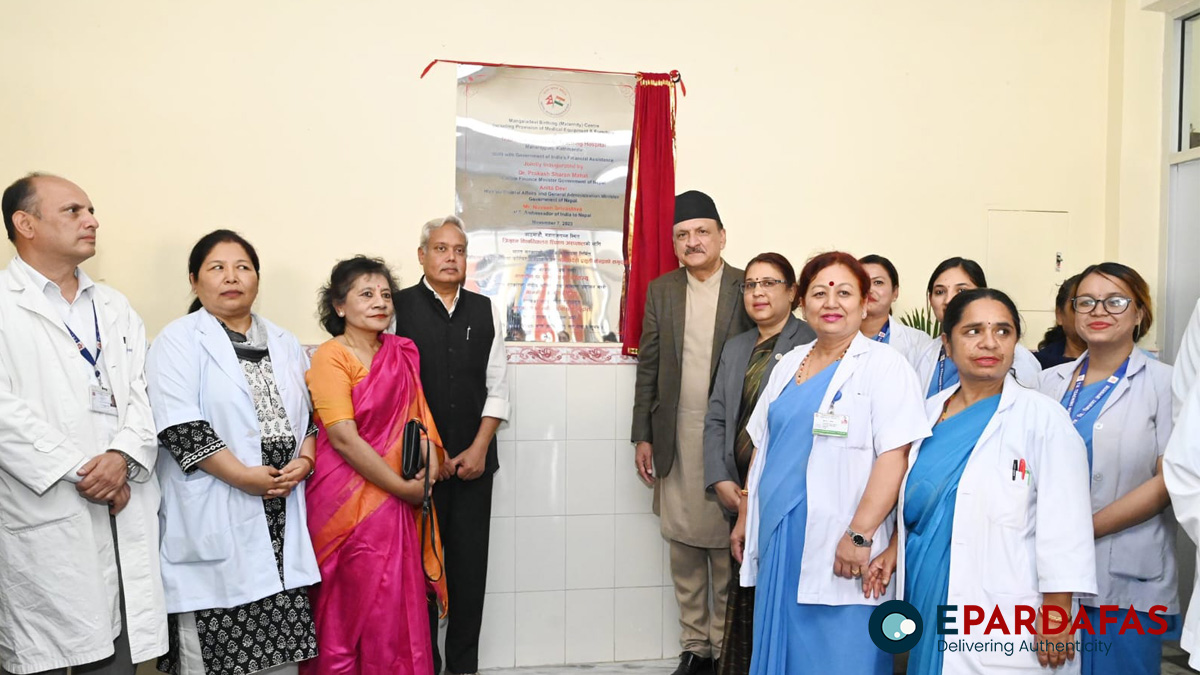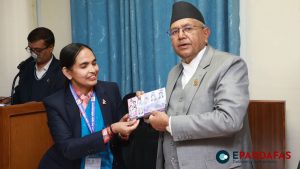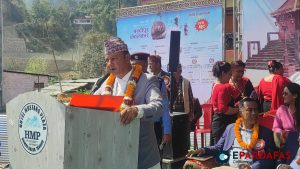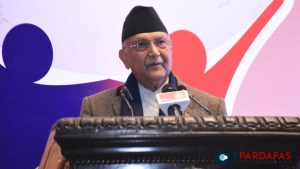
Indian Embassy in Kathmandu Hands Over Mangaladevi Birthing Centre to TUTH

Kathmandu, Nov 8: In a momentous event marking two decades of successful implementation of the High Impact Community Development Projects (HICDPs) in Nepal, the Embassy of India formally transferred the Mangaladevi Birthing (Maternity) Centre at Tribhuvan University Teaching Hospital (TUTH) to the hospital’s representatives.
This state-of-the-art birthing center was constructed to commemorate the 20th anniversary of the initiation of the High Impact Community Development Projects (HICDPs) in Nepal. It was developed with India’s financial assistance of NPR 44.04 million as an HICDP under the Nepal-India Development Cooperation framework.
The handover ceremony featured the presence of distinguished officials, including Dr. Prakash Sharan Mahat, the Finance Minister of the Government of Nepal, Anita Devi, the Minister for Federal Affairs & General Administration of the Government of Nepal, and Naveen Srivastava, the Ambassador of India to Nepal. Moreover, political representatives, Nepal Government officials, social workers, and local community leaders attended this significant event.
Additionally, three more HICDP projects with a total estimated cost of NPR 130 million, set to be executed in the Baitadi and Mustang districts, were formalized during the occasion. These projects reflect India’s enduring commitment to the socio-economic development of Nepal.
Tribhuvan University Teaching Hospital, a prestigious medical institution in Nepal, received the Mangaladevi Birthing Centre through this initiative. Furthermore, two sets of 40 KVA Diesel Generators, five buses, and two ambulances were provided to different departments, including during the COVID-19 pandemic. One of the ambulances is fully equipped with Advance Life Support.
Representatives from TUTH have expressed that this birthing center is currently managed by nurses and could serve as a model birthing center for implementation in other regions across Nepal, potentially reducing maternal mortality rates.
HICDPs, formerly known as Small Development Projects, were launched on November 7, 2003, through a bilateral agreement between the Governments of Nepal and India regarding India’s Grant Assistance for Implementation of Small Development Projects through Nepali entities operating at the local level. These projects are a critical segment of the Development Partnership with Nepal and are being implemented in the priority sectors of the Government of Nepal to create infrastructure that enhances the quality of life for the people of Nepal at the grassroots level.
During the event, Ambassador Srivastava highlighted the tremendous success of the HICDP projects implemented over the past two decades. He expressed his satisfaction that since 2003, nearly 550 projects have been initiated under this framework across various sectors, including Education, Health, Road & Bridges, River Training, Drinking Water, Electrification, Irrigation, Culture, and Social Welfare, which have had a direct impact on people’s lives. Out of these projects, 480 have been successfully completed, with the rest currently in progress. This translates to more than 27 projects being initiated every year or more than one new project every fortnight in Nepal under Nepal-India Development Cooperation over the last 20 years.
Ambassador Srivastava expressed his gratitude to the Government of Nepal for its support and pledged to further enhance and strengthen the implementation of HICDPs in the future. These HICDPs have covered a diverse range of sectors and regions. They span across all the provinces of Nepal, with 84 projects in Koshi Province, 81 in Madhesh Province, 105 in Bagmanti Province, 61 in Gandaki Province, 60 in Lumbini Province, 14 in Karnali Province, and 41 in Sudurpaschim Province. These figures exclude the 107 projects that extend across more than one province.
Honorable Finance Minister Mahat extended his gratitude to India for its continued support in creating development infrastructure in Nepal. He highlighted the cornerstone role that HICDP projects play in the development partnership between India and Nepal, assuring full support from the Government of Nepal in implementing projects that positively impact the livelihoods of ordinary Nepali people.
Minister Anita Devi emphasized the quick gestation period of these projects and their role in local economic development. She expressed her thanks to the Government of India for its support, highlighting that, despite their small size, HICDPs create a significant impact on the lives of ordinary Nepali people, earning them the apt title of “Highly Impactful.”
Furthermore, the Government of India has consistently gifted ambulances and school buses to various institutions working in the health and education sectors in Nepal to celebrate Independence Day and Republic Day. To date, 974 ambulances and 234 school buses have been gifted to beneficiaries across different parts of Nepal. This initiative plays a crucial role in providing the first line of treatment and significantly contributes to the healthcare and education sectors, reaching people even in the remotest corners of Nepal.
A short video showcasing the journey of HICDP implementation over the last 20 years was also unveiled during the event.












Comments